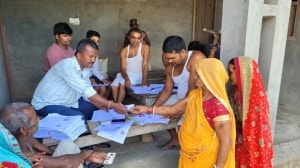COP30 host Brazil calls for additional structures to ensure climate commitments are delivered
Brazil’s Minister for Environment and Climate Marina Silva acknowledged that the US pull-out from the Paris Agreement would hurt progress on climate action.
 Brazil's Minister Marina Silva proposes additional mechanisms for climate action tracking ahead of COP30. (Express Photo)
Brazil's Minister Marina Silva proposes additional mechanisms for climate action tracking ahead of COP30. (Express Photo)
Brazil, the host of this year’s annual climate conference, COP30, has called for setting up of “additional” multilateral mechanisms “complementary” to the Paris Agreement framework to ensure commitments by countries on climate action are fulfilled.
In an interaction with journalists here Thursday, Brazil’s Minister for Environment and Climate Marina Silva acknowledged that the US pull-out from the Paris Agreement would hurt progress on climate action but said multilateral process was still the only way to effectively deal with the climate crisis. “For over 30 years (of climate change negotiations), there have been commitments that have not been fulfilled… It is important, this issue of reforming the global governance. President Lula (da Silva) of Brazil has mentioned this a few times. It is important for the UN system to be more effective.”
Minister Silva, who was in New Delhi to attend the annual World Sustainable Development Summit organised by TERI, said the idea is “to propose this discussion on (building) structures that could be complementary to the (UN) process to follow up on the commitments that have been made”.
“Of course, we understand that countries are sovereign, they establish their own climate commitments, construct and develop their own climate action plans…. However, we feel that there may be additional mechanisms or structures to monitor (the commitments) and go beyond what we already have (in terms of monitoring). For example, the NDCs (nationally-determined contributions) are reviewed every five years. Maybe this is not enough,” she said.
She, however, clarified that this was not part of the negotiation agenda at COP30, scheduled to be held in November in the Brazilian city of Belem. “It is important to fully acknowledge that…no country can do this on its own, all parties of the UNFCCC (UN Framework Convention on Climate Change) must attend to it together. This (the discussion on this proposal) is something that will take place in the action agenda of COP30… This is not part of the negotiations,” she said.
Action agenda refers to discussions that happen on the sidelines of COP meetings. These are voluntary and meant to encourage countries to take additional measures to fight climate change. Negotiations are the formal process through which decisions are taken by consensus. These decisions become international law.
On the US withdrawal from the Paris Agreement, she said it was incumbent upon other countries — Brazil, India, China, the EU, the UK and others — to work more closely to strengthen the multilateral system.







